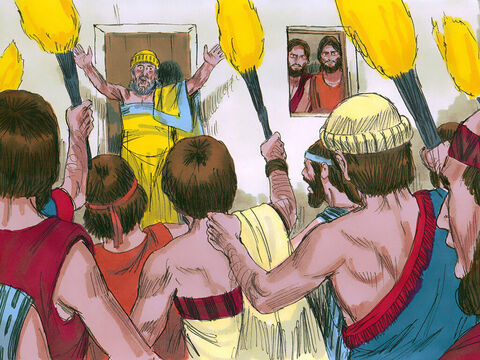I have commanded the ravens to feed you there. (v. 4) I have commanded a widow there to feed you. (v. 9)
What comes first into our minds when we are faced with difficulties or crises in our lives? Do we, in our own wisdom, cough up plans ourselves all the time without ever needing God? What happens when such plans fail? Do we weigh our options, shrug our shoulders and give up when everything seems to go wrong?
In our lives as Christians, we will face hardships, difficulties, and needs when we could barely sustain ourselves. But the scripture, in many passages, tells us not to worry but to put our trust in the Lord.

The life and ministry of Elijah also give us the same message: not to worry, for the Lord is always able. In his wisdom, God always provides – even in unusual conditions using unusual ways.
The Context and Background: Israel, Elijah, the Ravens, and the Widow
Looking into the context and background of the passage that has been read to us, we can see that Israel was in a state of turmoil. The united kingdom of Israel under king Solomon had become divided into the northern Kingdom of Israel and the southern Kingdom of Judah. Jeroboam, in the northern kingdom, began a policy contrary to the laws of the Lord. Even by the fourth dynasty, Omri continued the policies of Jeroboam, as 1 Kings 16:25-26 says, walking “in all the way of Jeroboam son of Nebat, and in the sins that he caused Israel to commit, provoking the Lord, the God of Israel, to anger by their idols.” Not only this, his son Ahab married Jezebel, a priestess of Baal, daughter of King Ethbaal of Sidon in Phoenicia. Ahab built a temple for Baal and his queen Jezebel brought into Israel a large entourage of priests and prophets of Baal. 1 Kings 16:30 says, “Ahab son of Omri did evil in the sight of the Lord more than all who were before him.”
It was in such a context that Elijah came into the scene. Apart from his reference as, “the Tishbite, of Tishbe in Gilead” (1 Kings 17:1), no other information about him is available. It is not even certain where Tishbe is located. The name Elijah (אֱלִיָּהוּ) means ‘Yah is El’ or ‘Yahweh is God.’ He was a prophet of the Lord and a contemporary with Ahab and Ahaziah.
It was this Elijah who declared to Ahab of the coming drought in the name of the Lord. This challenge was a direct challenge to Baal, the Canaanite god of rain, thunder, lightning, and dew. This was not only a challenge to Baal, it was also a challenge to Jezebel, her priests, Ahab, the Asherah, and also Israel.
Baalism or Baal worship had existed in prominence in ancient West Asian countries surrounding Israel. Its worshipers believed that Baal is the god of rain, a quite important god for agricultural communities. But through the word of the Lord, Elijah declared a drought to prove that it was Yahweh, the Lord, and not Baal, who is the God of all.
Elijah is then told to go and hide by the Wadi Cherith, a small brook east of the Jordan. The word ‘Cherith’ means to cut down or to cut off. The Lord also told Elijah that he had commanded the ravens to feed Elijah. This is a bird which under the law was unclean (Lev. 11:15; Dt. 14:14). Indeed, the birds brought him bread and meat morning and evening and Elijah drank from the brook.
But after a while, the brook dried up, and Elijah was sent to Zarephath, a place with the meaning ‘smelting place’. Elijah, being commanded to go to Zarephath is really significant in that Zarephath is situated about 13 km. south of Sidon in Phoenicia, the home of Jezebel. In simple words, God had sent Elijah to the very home of Baal worship.
Not only would it be extremely difficult for Elijah to go to the home of Baal worship, he was also asked to go to a widow, a Gentile widow at that. And moreover, God tells Elijah that it was the widow who was to feed him, a widow who did not have anything either, a widow who was at the throes of hunger and death herself. But the wisdom of God prevailed, and the widow and Elijah were fed.
The Wisdom of God in his Providence
Now, in the story, we can see God’s wisdom at every twist and turn. Beginning from the declaration of drought in the beginning to the story of Elijah and the widow in Zarephath, it was God who was always in command. From this story, I would like to highlight three points for our contemplation this morning.
1. God, in His wisdom, can use even the most unseemly things
It was an unusual situation where Elijah found himself embroiled. Though an unusual situation, God also uses the most unlikely or unseemly things – the unclean ravens and a Gentile widow to feed his servant.
In our lives as ministers and servants of the Lord, we may also come into a place where everything may seem to go wrong. We may think that the end has come. We may not be able to think of the future or ways to navigate through it. Let us put our trust in the Lord and boast in the Lord knowing that God can also use all circumstances, things, and people according to his will, however unlikely they may be; as 1 Corinthians 1:27-28 says, “But God chose what is foolish in the world to shame the wise; God chose what is weak in the world to shame the strong; God chose what is low and despised in the world, things that are not, to reduce to nothing things that are.” In this respect, too, God’s wisdom always surpasses and transcends human wisdom.
Another aspect of this point is that God is able to use sinners or people in the margins for his own glory. We may not always be saints, faithful or blameless. But God, in His wisdom can use even sinners like us. God is not too finicky about who we may have been. The natural propensities of the ravens to pick on carcasses, carrion, and weak animals were removed to feed Elijah. The hopelessness of the widow and her son had been changed into one of hope and life. Whatever we may have been, there is always room for sinners, the marginalized, and people in the periphery in God’s scheme of things.
As God is in command of everything, we see that he is able to use all circumstances. Therefore, God is also at no loss to look after the needs of his servants. This is the second point.
2. God, in His wisdom, is at no loss to look after his servants’ needs
God also looks after his servants even if they may not know it. Romans 8:28 tells us, “We know that all things work together for good for those who love God, who are called according to his purpose.” Elijah may have felt that he had been abandoned or too lonely – being hunted by Ahab and Jezebel. He may have been afraid too. However, God is always on the lookout for Elijah and his welfare.
Likewise, in our ministry, we may sometimes feel abandoned, unwanted, in need, and in hunger. But we will remember that God is never at loss to look after the needs of his servants. We may not have things in abundance, but we will have what we need. The Lord will provide; we may not know how, but in his wisdom, he has his own ways and methods of providing for us. In the wilderness, the Israelites also had just enough to eat in the manna that was provided to them by God.
Thirdly…we also know that
3. God, in His wisdom, blesses those whom he uses
If we look at the condition of the widow, she was about to take her last meal with her son. This is another strange situation. When God wanted to sustain his servant, he sent him to a widow who seemed to have no means of helping him or even herself. But, in a test of faith, Elijah had asked her to prepare a meal for him, and the widow did what was asked of her. By helping Elijah, the widow helped herself and her son survive the drought and famine. The jar of meal and the jug of oil did not go empty for all of them.
When we take steps towards the service of the Lord, we may not have much. But God wants us to have faith because he is the ruler of all and, in his wisdom, is always able to provide us. To be helpers or as someone God uses, like the widow, we must take a leap of faith so that the wonderful works of God and his wonderful wisdom may be seen by us and in us.
Conclusion
And so, my dear brothers and sisters in Christ, let us remember that our God is an awesome God, able to work in conventional and unconventional ways, the true God over everything else. Elijah was sent to a place of Baal worship, asked to challenge it. But it was God’s intention to make Elijah be simply obedient. When God works, God’s supply never lacks because God, in His wisdom
- Can use even the most unusual or unlikely things
- Is at no loss to look after his servants’ needs, and
- Blesses those whom he uses
Therefore, we must have faith, trust, obedience, and understanding that God works in unconventional ways and always put our trust in the wisdom of God in his providence.
Author: Rev. Dr. James R. Ruolngul





